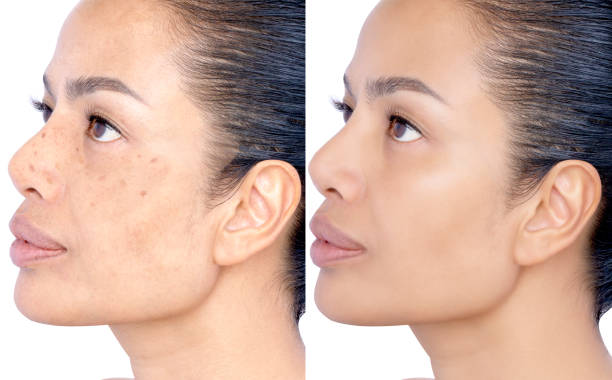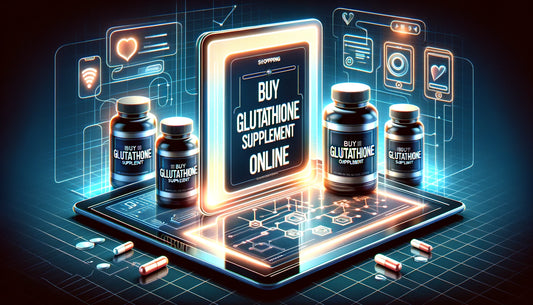

Top 10 Benefits of Glutathione for Skin Pigmentation: Reclaiming Even Skin Tone
Table of Contents
Do you struggle with pigmentation issues like dark spots, uneven skin tone, and hyperpigmentation? If so, you're not alone.
Many people face the same problem and are on the lookout for a solution that can provide them with clear, even-toned skin. This is where glutathione comes in - a powerful antioxidant that can work wonders for your skin.
In this post, we will delve into the science behind how glutathione works, its various health benefits, and specifically how it can help to reclaim your even skin tone by reducing pigmentation.
So let's get started on exploring the top 10 benefits of glutathione for skin pigmentation and how you can use it to achieve radiant, healthy-looking skin!
What is Glutathione?
Glutathione, a powerful antioxidant composed of amino acids, plays a crucial role in cellular health. It protects cells from damage and contributes to skin brightening and overall health. Understanding the function of glutathione is essential for reaping its skin benefits.
The Impact of Glutathione on Skin Pigmentation
Glutathione's effect on skin pigmentation is significant, influencing melanin production and ultimately affecting skin tone. This impact plays a vital role in supporting even skin tone and promoting overall skin health. The molecule's influence on pigmentation is well-documented and underscores its importance for maintaining healthy skin. Understanding the role of glutathione in skin pigmentation is essential for harnessing its benefits for skin health.
The molecule's ability to modulate melanin production offers a promising avenue for addressing dark skin issues and reducing the appearance of pigmentation-related concerns such as liver spots and acne scars.
How Glutathione Affects Melanin Production?
Glutathione's impact on melanin production is significant. By inhibiting tyrosinase activity, it reduces the synthesis of melanin, leading to lighter skin and a lower melanin index. Moreover, glutathione therapy has shown a substantial reduction in melanin production, emphasizing its role in addressing pigmentation issues.
The molecule's potent antioxidant properties combat oxidative stress, benefitting skin health and contributing to an even skin tone. This effect of glutathione on melanin production underscores its potential in addressing dark skin concerns and promoting skin health.

What Are the Top 10 Benefits of Glutathione for Skin Pigmentation?
#1 Skin Lightening:
Melanin production determines our skin coloration. Glutathione inhibits the production of melanin, helping to lighten the skin. By doing so, it can address hyperpigmentation, dark spots, and uneven skin tone, offering a more uniform complexion.
#2 Anti-Aging:
As an antioxidant, glutathione combats free radicals, molecules that damage cells and contribute to aging. By neutralizing these free radicals, it potentially diminishes the appearance of fine lines, wrinkles, and other signs of aging, promoting a more youthful look.
#3 UV Protection:
Glutathione provides some defense against UV radiation, shielding the skin from sun damage. This protection not only helps in preventing darkening due to sun exposure but also reduces the risk of skin issues associated with prolonged UV exposure.
#4 Detoxification:
Crucial for detox processes in the body, glutathione aids in removing toxins. This indirectly benefits the skin by eliminating substances that could contribute to various skin issues, promoting a clearer and healthier complexion.
#5 Reduction of Skin Conditions:
Glutathione's regulation of melanin production and its anti-inflammatory properties might assist in improving conditions like melasma, acne, and vitiligo, potentially reducing their severity or occurrence.
#6 Enhanced Skin Health:
By bolstering overall health and immune function, glutathione contributes to healthier skin from within. This leads to a natural radiance and better skin texture, reflecting overall well-being.
#7 Even Skin Tone:
Glutathione helps in reducing blotchiness and discoloration caused by factors such as sun damage, hormonal changes, or scarring. This contributes to a more even and consistent skin tone.
#8 Faster Wound Healing:
The antioxidant nature of glutathione supports wound healing and tissue repair. This can potentially minimize scar visibility and accelerate recovery from injuries or wounds.
#9 Collagen Production:
Stimulating collagen synthesis, glutathione aids in maintaining skin elasticity and firmness. By doing so, it helps in reducing the appearance of fine lines and wrinkles, promoting smoother and younger-looking skin.
#10 Boosted Immune Function:
A strong immune system indirectly supports skin health by warding off infections and inflammation that might affect the skin. Glutathione's role in enhancing immune function contributes to overall skin well-being.

How to Use Glutathione for Skin Pigmentation?
Using glutathione for skin pigmentation can be effective when following the recommended dosage. Supplementing with oral glutathione, combined with dietary supplements, is known to support reduction of skin pigmentation. Under professional guidance, glutathione injection can also be an effective treatment option. Limit sun exposure during glutathione therapy.
How Glutathione Helps Reduce Hyperpigmentation?
Glutathione therapy showcases skin lightening effects and diminishes dark spots, addressing uneven skin tone and pigmentation. Through reducing oxidative stress and sun exposure, glutathione supplementation benefits skin pigmentation, brightening, and tone, showing a significant decrease in melanin production. This demonstrates the effect of glutathione on dark skin, effectively reducing hyperpigmentation and liver spots.
A systematic review of its benefits for Filipino women revealed improvements in skin color, fine lines, and acne scars. Research also suggests its potential in mitigating liver diseases and enhancing mitochondrial function, supporting its efficacy for skin health. The Department of Health recognizes oral mucosa as a route for glutathione absorption, emphasizing the dosage of glutathione for optimal results.
How Does Glutathione Work at the Cellular Level?
Glutathione plays a crucial role in regulating cellular functions, which directly impact skin health. It supports cellular repair and renewal processes, influencing melanin production and ultimately affecting skin pigmentation. Understanding the cellular effects of glutathione is essential for maintaining optimal skin health.
Let’s Sum Up
To summarize, Glutathione offers numerous benefits for achieving an even skin tone and combating skin pigmentation issues. Its antioxidant properties help reduce melanin production, leading to a more balanced complexion.
Ultimately, by utilizing Glutathione effectively, you can achieve radiant and even-toned skin, reclaiming your confidence and embracing your natural beauty.
















